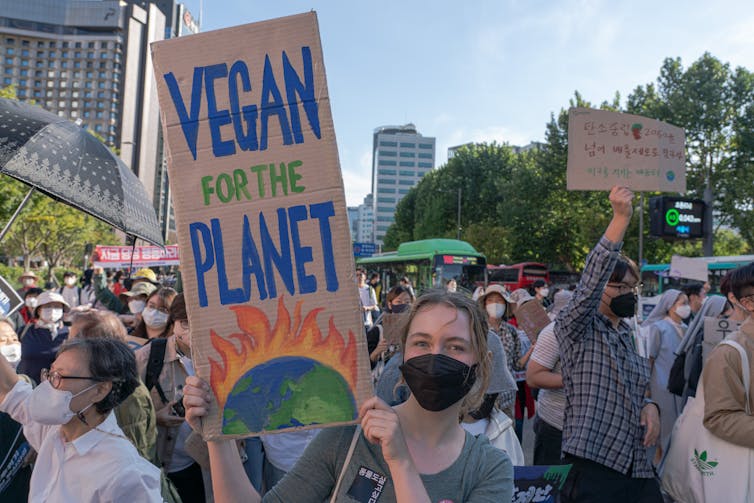New applied sciences often comply with the know-how adoption life cycle. Innovators and early adopters rush to embrace new applied sciences, whereas laggards and skeptics leap in a lot later.
At first look, it appears like synthetic intelligence is following the identical sample, however a brand new crop of research means that AI would possibly comply with a distinct course – one with vital implications for enterprise, training and society.
This basic phenomenon has typically been described as “AI hesitancy” or “AI reluctance.” The standard adoption curve assumes an individual who’s hesitant or reluctant to embrace a know-how will ultimately accomplish that anyway. This sample has repeated again and again – why would AI be any completely different?
Rising analysis on the explanations behind AI hesitancy, nevertheless, suggests there are completely different dynamics at play which may alter the standard adoption cycle. For instance, a latest research discovered that whereas some causes of this hesitation intently mirror these concerning earlier applied sciences, others are distinctive to AI.
In some ways, as somebody who intently watches the unfold of AI, there could also be a greater analogy: veganism.
AI veganism
The thought of an AI vegan is somebody who abstains from utilizing AI, the identical manner a vegan is somebody who abstains from consuming merchandise derived from animals. Usually, the explanations folks select veganism don’t fade mechanically over time. They is perhaps causes that may be addressed, however they’re not nearly getting extra snug consuming animals and animal merchandise. That’s why the analogy within the case of AI is interesting.
Not like many different applied sciences, it’s vital to not assume that skeptics and laggards will ultimately develop into adopters. Lots of these refusing to embrace AI truly match the standard archetype of an early adopter. The research on AI hesitation centered on school college students who are sometimes among the many first demographics to undertake new applied sciences.
There’s some historic precedent for this analogy. Below the hood, AI is only a set of algorithms. Algorithmic aversion is a widely known phenomenon the place people are biased towards algorithmic decision-making – even whether it is proven to be simpler. For instance, folks desire relationship recommendation from people over recommendation from algorithms, even when the algorithms carry out higher.
However the analogy to veganism applies in different methods, offering insights into what to anticipate sooner or later. In reality, research present that three of the primary causes folks select veganism every have a parallel in AI avoidance.
Moral issues
One motivation for veganism is concern over the moral sourcing of animal by-products. Equally, research have discovered that when customers are conscious that many content material creators didn’t knowingly choose into letting their work be used to coach AI, they’re extra prone to keep away from utilizing AI.
Many vegans have moral issues in regards to the therapy of animals. Some individuals who keep away from utilizing AI have moral issues in regards to the therapy of content material creators.
Vuk Valcic/SOPA Photos/LightRocket through Getty Photos
These issues have been on the heart of the Writers Guild of America and Display screen Actors Guild-American Federation of Tv and Radio Artists strikes in 2023, the place the 2 unions argued for authorized protections towards firms utilizing creatives’ works to coach AI with out consent or compensation. Whereas some creators could also be protected by such commerce agreements, a number of fashions are as a substitute educated on the work of novice, impartial or freelance creators with out these systematic protections.
Environmental issues
A second motivation for veganism is concern over the environmental impacts of intensive animal agriculture, from deforestation to methane manufacturing. Analysis has proven that the computing sources wanted to help AI are rising exponentially, dramatically growing demand for electrical energy and water, and that effectivity enhancements are unlikely to decrease the general energy utilization as a result of a rebound impact, which is when effectivity positive factors spur new applied sciences that eat extra vitality.
One preliminary research discovered that growing customers’ consciousness of the facility calls for of AI can have an effect on how they use these techniques. One other survey discovered that concern about water utilization to chill AI techniques was a consider college students’ refusal to make use of the know-how at Cambridge College.

Each AI and meat manufacturing spark issues about environmental impression.
Kichul Shin/NurPhoto through Getty Photos
Private wellness
A 3rd motivation for veganism is concern for potential adverse well being results of consuming animals and animal merchandise. A possible parallel concern could possibly be at work in AI veganism.
A Microsoft Analysis research discovered that individuals who have been extra assured in utilizing generative AI confirmed diminished essential considering. The 2025 Cambridge College survey discovered some college students avoiding AI out of concern that utilizing it might make them lazy.
It isn’t arduous to think about that the potential adverse psychological well being results of utilizing AI might drive some AI abstinence in the identical manner the potential adverse bodily well being results of an omnivorous eating regimen might drive some to veganism.
How society reacts
Veganism has led to a devoted business catering to that eating regimen. Some eating places characteristic vegan entrees. Some producers focus on vegan meals. May or not it’s the case that some firms will attempt to use the absence of AI as a promoting level for his or her services?
If that’s the case, it could be just like how firms reminiscent of DuckDuckGo and the Mozilla Basis present different engines like google and net browsers with enhanced privateness as their important characteristic.
There are few vegans in comparison with nonvegans within the U.S. Estimates vary as excessive as 4% of the inhabitants. However the persistence of veganism has enabled a distinct segment market to serve them. Time will inform if AI veganism takes maintain.



